
Anxiety and Addiction
Understanding Anxiety and Addiction
The relationship between anxiety and addiction is a complex and multifaceted subject. Both conditions can significantly impact an individual's life, often creating a vicious cycle that can be difficult to break.

Defining Anxiety and Addiction
Anxiety is more than temporary worry or fear. It is a chronic condition that can interfere with daily activities such as job performance, schoolwork, and relationships [1]. Symptoms of anxiety disorders can include constant worry, restlessness, and trouble with concentration.
Addiction, on the other hand, is a complex condition characterized by compulsive substance use despite harmful consequences. People with addiction have an intense focus on using a certain substance(s), like alcohol or drugs, to the point where it takes over their life.
The Connection Between Anxiety and Addiction
Research has shown that anxiety and substance use disorders co-occur at greater rates than would be expected by chance alone [2]. Generalized anxiety disorder (GAD) and panic disorder (PD), in particular, have the highest associations with substance use disorders.
In at least 75% of cases, anxiety disorders predate substance use disorders, supporting the prevalence of the self-medication pathway. This suggests that many people with anxiety may turn to substances as a way to cope with their symptoms, which can lead to the development of an addiction over time [2].
The co-occurrence of anxiety disorders and substance use disorders can have a significant impact on the course and treatment outcome for both conditions. For example, the presence of a substance use disorder is associated with an elevated risk of suicide in patients with panic disorder.
Understanding the complex relationship between anxiety and addiction is key to developing effective treatment strategies. Recognizing the interconnectedness of these conditions can help clinicians provide comprehensive care that addresses both the mental health and substance use needs of their patients.
Types of Anxiety Disorders
Anxiety disorders are a group of related conditions, each characterized by persistent fear or worry in situations that are not threatening. Understanding the different types of anxiety disorders is crucial when dealing with the complex interplay between anxiety and addiction.
Generalized Anxiety Disorder
Generalized Anxiety Disorder (GAD) involves persistent feelings of anxiety or dread, which can interfere with daily life. It's important to note that GAD is not the same as occasional worry or anxiety due to stressful life events NIMH.
GAD commonly co-occurs with substance use disorders. Individuals with both conditions have a lower likelihood of recovery from GAD and an increased risk of exacerbation. Treatment options for comorbid GAD and substance use include SSRIs, buspirone, and cognitive-behavioral therapy NCBI.
Panic Disorder
Panic disorder is characterized by frequent and unexpected panic attacks. These are sudden periods of intense fear, discomfort, or a sense of losing control. Panic attacks can occur as frequently as several times a day or as rarely as a few times a year NIMH.
Panic disorder is twice as common in women as compared to men, and individuals with panic disorder are more likely to have a drug or alcohol dependence. Panic attacks early in recovery that persist or increase during abstinence may indicate the presence of panic disorder NCBI.
Social Anxiety Disorder
Social anxiety disorder is an intense, persistent fear of being watched and judged by others. It may interfere with work, school, or other daily activities NIMH.
Individuals with social anxiety disorder are more likely to have a drug or alcohol dependence, and the onset of social phobia typically precedes the initiation of substance use. Treatment options for comorbid social anxiety disorder and substance use include SSRIs, fluvoxamine, and gabapentin NCBI.
In conclusion, understanding these anxiety disorders and their relationship to addiction can lead to more effective treatments and better outcomes for individuals struggling with both conditions.
The Impact of Anxiety on Substance Use
Understanding the relationship between anxiety and substance use is key to comprehending the complexities of these co-occurring disorders. Anxiety and substance use disorders often coexist at rates greater than chance alone, making it a subject of considerable interest among researchers and clinicians.
How Anxiety Influences Substance Use
Anxiety disorders involve more than temporary worry or fear and can interfere with daily activities like job performance, schoolwork, and relationships [1]. When individuals struggle with managing these persistent feelings of anxiety, they may turn to substances as a form of self-medication.
Epidemiologic studies have consistently found that individuals with substance use disorders often meet criteria for an independent anxiety disorder. Approximately 17.7% of individuals with a substance use disorder also have an independent anxiety disorder, and 15% of those with any anxiety disorder have at least one co-occurring substance use disorder [3].
Furthermore, anxiety disorders have been linked to an increased severity of lifetime alcohol use disorders, increased lifetime service utilization among individuals with a substance use disorder, increased severity of alcohol withdrawal, and higher relapse rates following substance abuse treatment. The presence of a substance use disorder can impact the course of anxiety disorders and is associated with an elevated risk of suicide in patients with panic disorder.
The Self-Medication Pathway
The self-medication pathway is a widely recognized concept in the field of substance use. It refers to the process where individuals use substances to alleviate their symptoms of anxiety. This pathway is prevalent in the relationship between anxiety and addiction, with anxiety disorders predating substance use disorders in at least 75% of cases [2].
Notably, substance-induced anxiety disorders are quite rare, occurring in only 0.2% of comorbid cases. This suggests that the majority of substance use in individuals with anxiety disorders is a form of self-medication, rather than a direct result of the substance use itself.
This self-medication pathway presents a vicious cycle where substance use temporarily reduces anxiety symptoms, yet over time, it exacerbates the underlying anxiety disorder and leads to the development of a substance use disorder. Breaking this cycle is a significant challenge but is crucial for effective treatment and long-term recovery.
Recognizing Comorbidity in Anxiety and Addiction
The interplay between anxiety and addiction often results in comorbidity, a term used when two disorders occur in the same individual. This co-occurrence is notably higher than what would be expected by chance alone, creating significant interest among researchers and clinicians [2].
Prevalence of Comorbidity
In the United States, the prevalence of comorbid anxiety and substance use disorders is significant, with 28.8% and 14.6% respectively. Moreover, it's been found that in at least 75% of cases, anxiety disorders predate substance use disorders, further supporting the self-medication pathway. This means that individuals often turn to substances as a way of coping with their existing anxiety symptoms.
Several epidemiologic studies conducted over the past 20 years consistently indicate that anxiety disorders and substance use disorders co-occur more commonly than would be expected by chance alone. The most recent survey found that 17.7% of respondents with a substance use disorder also met criteria for an independent anxiety disorder, and 15% of those with any anxiety disorder had at least one co-occurring substance use disorder.
Consequences of Co-occurring Disorders
The implications of comorbid anxiety and addiction are profound. Both disorders can significantly impact the course and treatment outcome for the other. For instance, the presence of a substance use disorder can exacerbate anxiety symptoms, making them even more difficult to manage. Conversely, severe anxiety can drive an individual to use substances more frequently or in larger amounts, escalating the addiction [2].
More alarmingly, the presence of a substance use disorder is associated with an elevated risk of suicide in patients with panic disorder. This highlights the need for comprehensive and integrated treatment approaches that address both the anxiety and addiction simultaneously.
Understanding the prevalence and consequences of comorbid anxiety and addiction is crucial for improving treatment outcomes. It underscores the importance of early detection and intervention, as well as the need for treatments tailored to the unique needs of individuals struggling with these co-occurring disorders.
Treatment Options for Anxiety and Addiction
When confronting the dual challenges of anxiety and addiction, a comprehensive treatment approach is often necessary. This typically includes both pharmacotherapy and psychotherapy treatments to address the biological and psychological aspects of these disorders.
Pharmacotherapy Treatments
Pharmacotherapy, or medication treatment, is often a key component of managing comorbid anxiety and substance use disorders. Medications such as paroxetine and sertraline have been evaluated for their efficacy in treating these co-occurring disorders.
However, it's important to note that some medications, like benzodiazepines, are generally avoided in individuals with substance use disorders due to their addictive potential. While they may be used as an adjunctive medication in the early treatment phase, they should be avoided in patients with current or past substance use disorders.
Psychotherapy Approaches
Psychotherapy, or talk therapy, is another cornerstone of treating anxiety and addiction. Cognitive-behavioral therapy (CBT) is a successful platform for developing specialized treatments for individuals with both disorders. Its aim is to help individuals recognize and change maladaptive thought patterns and behaviors that may contribute to their conditions.
Additionally, mindfulness-based relapse prevention (MBRP) and Community Reinforcement and Family Therapy (CRAFT) are two psychosocial interventions that have shown promise in reducing substance use and engaging loved ones in treatment for individuals with co-occurring anxiety and substance use disorders [3].
By combining pharmacotherapy and psychotherapy, individuals with anxiety and addiction can address both the physical symptoms and underlying psychological issues, increasing their chances of success in recovery. Remember, each individual's treatment plan should be tailored to their unique needs, and adjustments may be necessary over time.
The Role of Genetics in Anxiety and Addiction
In understanding the complex relationship between anxiety and addiction, it's essential to consider the role of genetics and neuroscience. Various intrinsic factors, such as genotype, age, and preexisting mental illness, interact with the addictive agent's nature and external factors to influence addiction. Moreover, neurotransmitters that aid in communication within the brain also play a pivotal role.
Genetic Determinants of Addiction
Addiction is influenced by an interplay of intrinsic factors like genotype, sex, age, preexisting addictive disorder, or other mental illnesses. It also considers extrinsic factors, such as a person's childhood, level of education, socioeconomic status, social support, and drug availability. The nature of the addictive agent, including its pharmacokinetics, path of administration, and psychoactive properties, also comes into play.
Genetically, heritability is responsible for 40-60% of the population's variability in developing an addiction. Genome-wide association studies (GWASs) have identified genetic variants associated with nicotine dependence and other substance addictions. However, Single Nucleotide Polymorphisms (SNPs) explain only a part of the variance in substance addiction, and further research is needed.
Moreover, epigenetic changes, such as DNA methylation and modifications of histones, play a role in addiction to psychostimulants. Repeated stressful life events can cause these epigenetic changes, making individuals more vulnerable to neuroplastic changes induced by drugs.
The Role of Neurotransmitters
Neurotransmitters, the chemical messengers of the brain, are also involved in addiction. They play roles in reward processing, motivation, and craving. For example, dopamine is a key neurotransmitter involved in the reward system and motivation-reward-reinforcement cycle in addiction. Other neurotransmitters involved in addiction include serotonin, endogenous opioids, acetylcholine, GABA, and glutamate [4].
Understanding the genetic basis of addiction and the role of neurotransmitters can help in developing effective treatments for individuals struggling with addiction. It can also shed light on how anxiety and addiction are intertwined, providing a more comprehensive approach to managing these co-occurring disorders.
References
[1]: https://www.nimh.nih.gov/health/topics/anxiety-disorders
[2]: https://www.ncbi.nlm.nih.gov/pmc/articles/PMC2904966/
[3]: https://www.ncbi.nlm.nih.gov/pmc/articles/PMC3775646/
When mental health challenges and addiction intersect, it can feel isolating. At Arista, we offer compassionate, evidence-based, and trauma-informed care to help you heal, grow, and move forward.
You’re not alone in this.
When mental health challenges and addiction intersect, it can feel isolating. At Arista, we offer compassionate, evidence-based, and trauma-informed care to help you heal, grow, and move forward.
Support that moves with you.
You’ve taken a brave first step. At Arista Recovery, we’re here to help you continue with best-in-class care designed for long-term healing and support.
.webp)






